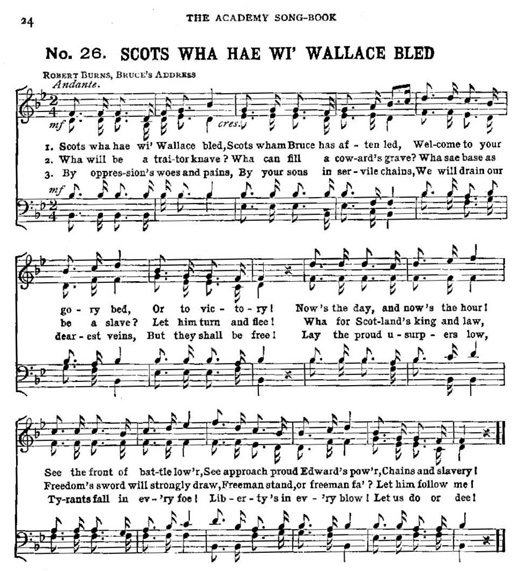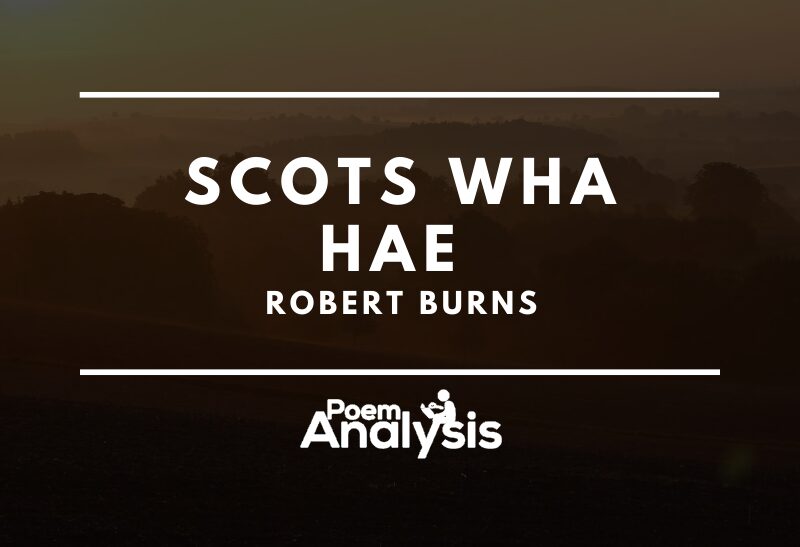Robert Burns is one of the most popular poets of the century. He brought about a revolution in his poetry. We have a variety of concepts in his poems.
“Scots Wha Hae” is a very well-known poem by Burns that tells us a very good story. Most of his poems are filled with a particular story is an attractive feature of Robert Burns’s poetry.
Table of Contents
Summary
In the very first line of the story, the poet tells is asking what makes Wallace bleed. In the next line, he further calls Wallace as Scots and says who is forcing him to lie down.
He welcomes the Scots to his violence and bloodshed where he is going to stay for long. Burns calls this life a ‘victory’. Why this is a victory this is not written maybe there lies an irony.
scots wha hae robert burns lyrics
“Now’s the day, and now’s the hour;
See the front o’ battle lour;
See approach proud Edward’s power—
Chains and slavery!”
In the next stanza here the poet utters, that this is the present and hour. This is why the poet is asking to watch the battle with wide-open eyes.
So, why the poet tells such words are still not very clear. Now dedicated to King Edward he is saying to see his power, chains, and slavery. Here the stanza ends with an unclean atmosphere.

Then the next stanza begins with a kind of the same thing where he is asking what shall be the knave of a traitor? What is the thing that can fill the graveyard of a coward and what she gets upgraded by the slave? The poet is needed to know these answers so he is saying to the person to turn up and fly.
“Wha for Scotland’s king and law
Freedom’s sword will strongly draw,
Freeman stand, or freeman fa’,
Let him follow me!”
Burns further speaks out of Scotland’s king who has produced law. For these laws, freedom’s sword will be drawn much more strongly. The Freeman stands for the drawn sword and lets him follow the rules of Scotland.
So, here the poet is becoming a bit personal and saying to follow the law of Scotland. Probably this poem is about the land of Scotland which is why he is saying about the opposition’s pain and woes.

This is addressing a battle that probably was going on at that time. He takes the name of native sons who will not be alive for the battle. This is why Burns is saying for making drainage for the dearest veins.
He knows well that people will die on the field so he is saying to drain out the veins to make the pain fade.
“Lay the proud usurpers low!
Tyrants fall in every foe!
Liberty’s in every blow!—
Let us do or die!”
Here, Robert Burns is saying to lay on the pride for sacrifice. Even the tyrants will also fall in every enemy and the liberty will blow. In that life poet’s life has become crucial so he has to do something else to die.
This is the whole poem where the war-like situation is being portrayed.
Theme
The poem is actually a national poem that gets attention from the critical world. The main theme is the battlefield that the poet has reflected poem. Love for the country also plays a grand role and the loss of their own blood also becomes a theme of the poem.
Analysis
The Scottish poet Robert Burns is mainly famous for his nationalistic approach. Here, the poet reflects on the situation of the country and the king’s power.
King Edward was the king of Scotland at that time who took up the battle. The poet is appreciating the laws because of not having any other option. This is how the poem is going. In the last line poet tells a genuine fact,
“Let us do or die”
This line is very relevant because it is opening his mind. The poet and the other people do not have other options. That is why they will do or die.
Rhetorical Devices
In the poem, there always have some components that help the poet to make the content highly impressive. Here, Burns followed a rhythm scheme which is ‘aaab cccb ddde fffe ggge hhhe”.
Syncope is a very common device in Burns’s poetry. When a word used to be written using an apostrophe this is called Syncope. Like, “now’s”, “Liberty’s”, “fa’ “, etc.
Consonance is another device that provokes the repetition of consonantal sounds in the line like,
“wha hae wi’ Wallace bled,”
The ‘w’ sound is repeated three times.
Anaphora is also a rhetorical device that means the repetition of the same words at the beginning of the lines one after another like,
“Wha will be a traitor knave?
Wha can fill a coward’s grave!
Wha sae base”
The allusion is one of the most relevant poetic use of Burns. Here the poet talks about King Edward which is a historical event. This is how the poet uses allusion in the poem.
Still, some minor devices remain here for making the poem most relevant.
